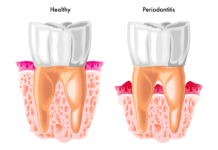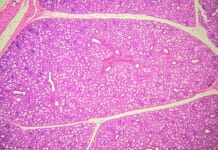Every year, advances in medical and dental research uncover new ways in which a healthy oral cavity contributes to overall health and vice versa. Many of the bacteria we once thought were limited to the mouth and throat have been discovered to play important roles in health or disease conditions throughout the body.
For decades, periodontitis has been positively linked with low birth weight in babies. Low birth weight is not only a serious risk factor for heart and respiratory diseases in infants, but low birth weight babies go on to have increased risk of chronic conditions like heart disease, diabetes, and metabolic syndrome as adults. In the early 2000s, further study on the subject revealed a specific link between Porphyromonas gingivalis antibodies and low birth weight in babies, even when controlled for other factors.
Further studies in the subsequent years revealed still more maternal risk associated with P. gingivalis. In 2009, studies revealed that P. gingivalis colonizes placental tissues, contributing to preterm delivery. In fact, as many as 40-50% of preterm deliveries can be attributed to a bacterial infection of some kind. It is theorized that P. gingivalis infects the oral cavity, and then, through mastication, is able to spread and reach the placenta and amniotic fluid, affecting the health and maternity outcomes of the fetus.
The following years brought suggestive correlations between oral health and reproductive health in women:
- Periodontal disease has been linked to endometriosis, and they share common risk factors.
- Gingival inflammation is associated with poorer outcomes from in vitro fertilization, but it’s unclear what the root causes may be.
- Periodontal disease has been associated with limiting conception in the non-Caucasian population but, again, the causes are unclear.
The most recent of the studies to explore this subject came out just last year when researchers at the University of Helsinki and Helsinki University Hospital demonstrated a link between P. gingivalis and P. gingivalis antibodies, and reduced conception in women who were trying to become pregnant.
This study included 256 women, ranging from 19 – 42 years old, with a median age of 29.2 years. They were healthy and not currently pregnant, but had discontinued contraception in order to become pregnant. They were given vaginal examinations to determine the presence of bacterial vaginosis and were given oral examinations. Oral examinations measured the presence of caries, periodontal pocket depth, gingival bleeding when probed, clinical periodontal attachment loss, and visible plaque. Saliva samples were gathered and analyzed to detect the presence of P. gingivalis and A. actinomycetemcomitans, and saliva was also analyzed for the presence of immunoglobulin and antibodies against these bacteria.
12 months later, these bacteria levels were analyzed, along with the determination of which subjects had or had not become pregnant in the preceding year. While both P. gingivalis and A. actinomycetemcomitans are both strongly associated with periodontal disease, only P. gingivalis was associated with delayed conception, in a statistically significant measure, even when controlled for other factors among the subjects.
As with previous studies, the exact reason for the virulence of P. gingivalis is still unclear, although the researchers speculate that the species-specific immunomodulatory effects of P. gingivalis manipulate the host response in a way that negatively affects fertility and fertility outcomes.
While it is worth noting that this study was limited in size, geography, and did not include any testing of the male partners who have a role in the conception and fertility of the women studied, it is a suggestive study. The finding that not periodontal disease in general, but P. gingivalis specifically, plays a role in conception and fertility is a significant finding. It suggests further avenues for research, not just in wider studies, but of the specific virulence factors of that bacteria.
It also reinforces what previous studies have demonstrated: that women who want to have the best fertility outcomes should pay extra attention to their oral hygiene. The systems of the body are interconnected in surprising ways, and oral health is increasingly being recognized as a key factor in systemic health.










